Nusi stands in front of the gathered fishermen and starts explaining why she has summoned them together today. They listen attentively to this energetic 32-year-old. They know her well as she has been working with them for years here on Darawa Island, part of the Wakatobi Archipelago that stretches out into the Banda Sea from the southeastern tip of the Indonesian island of Sulawesi. She points to a poster showing the timeline of activities that she has planned. First, monitoring of their octopus catches, then using the monitoring data to generate baseline information, then making informed decisions on how to improve the management of this important fishery.
People on the small island of Darawa have little or no land available for farming and rely almost entirely on the ocean for their livelihoods. Octopus fishing is one of the most important sources of income for the villagers. Nusi goes on to explain her vision of the fishermen and women working together to manage their resources, just as other communities have achieved with similar fisheries elsewhere. With this she finishes her presentation and sits down. Nobody says a word.
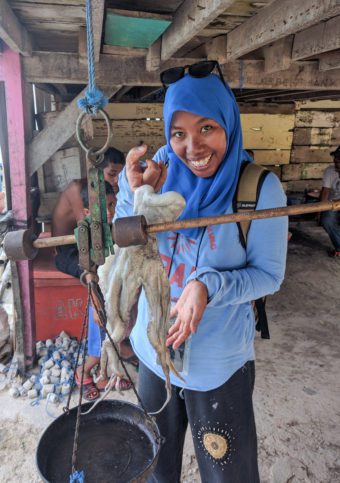
“Charismatic Nusi” has worked hard for her spot in the local conservation sector.
When I first came to Wakatobi, I heard my colleagues refer to this woman as “Charismatic Nusi”, and it quickly became clear that this was no understatement. Nusi is a cheerful and generous spirit – known for her wit and for speaking her mind. She has worked hard to carve herself a spot in the local conservation sector, which is – as throughout Indonesia – still dominated by men. Nusi speaks English, Bahasa Indonesia (Indonesia’s official language), Kaledupan (the local language) and even a little bit of Bajo (spoken by the former sea nomads of the region). She is passionate about community work, conservation, sustainable agriculture and books, books and more books. Her lively ways make her a favourite visitor of the islanders, and we are greeted and invited to tea everywhere we go.
Nusi is a member of Forkani, a community based organisation that has been working for over a decade to improve the livelihoods of communities on the Wakatobi island of Kaledupa. In a way, Forkani is much more than just an organisation. It is like a large family of members united by their passion to preserve the environment and local traditions. They have a community centred vision – just like Blue Ventures – and partnerships always work best when visions align.
In November 2016, Blue Ventures started supporting Forkani with the initiation of community based fisheries monitoring and sustainable management discussions. This support has enabled Forkani to build on Blue Ventures’ experiences in the western Indian Ocean, which have demonstrated the potential of temporary octopus fishery closures to rebuild fishery yield and catalyse community conservation.
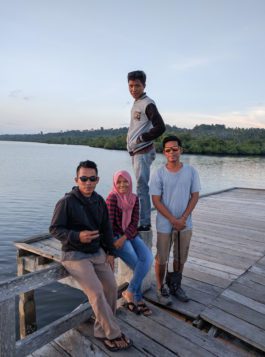
Some members of the community based organisation Forkani
Nusi scribbles some notes in her notebook and watches attentively as La Beloro, her boss, tells the fishermen of Darawa that the traditional leader of the area has come to show his support for their decisions. Forkani is presently working with the regency government and traditional leaders to strengthen their collaboration and ensure official recognition of traditional laws in natural resource management.
“What would you do if you had more money?” La Beloro asks, referring to the benefits of improved fisheries management. “I would get myself new teeth. How about you?” He grins.
Nusi laughs and shakes her head. La Beloro and Nusi are very excited about embarking on this new journey in monitoring and management. Forkani has been monitoring fish catches in Darawa for over a decade, but until now octopus has not featured on their workplan. It is almost as if this elusive animal has managed to remain camouflaged – just as it is on the reef – from the interest of conservationists and fishermen alike. This is also the first time that Blue Ventures’ periodic fishery closure model for octopus is being trialled on this side of the Indian Ocean. The fishermen are excited, and so are we!
The ancestors of the people of Madagascar sailed across the Indian Ocean from the Malay Archipelago back in the 8th or 9th century AD, and even today there are many linguistic similarities between the two countries – including the local word for octopus!
There are a lot of questions, mostly about octopus fishing in Madagascar, an area where Blue Ventures has considerable experience. They range from questions about fishing gear to ones about octopus size, and from increased prices to closure seasons. Later this year, to help answer some of these questions, we’ll be accompanying community members from Darawa on a visit to communities in Madagascar who have been managing their octopus fisheries through locally enforced fishing closures for over a decade.
But for now, it is time to leave. The sun is setting as our boat navigates its way between the seaweed lines and the shallows on its return to Langge village on the adjacent island of Kaledupa where our team is based. I sit next to Nusi in the boat, watching together as the last rays of light disappear behind the hills of Kaledupa Island.
“That went well, right?!” I ask, tugging at her sleeve. She gives me a big, confident smile and winks. I sit back and relax. There is simply nobody better than her to be leading this project.


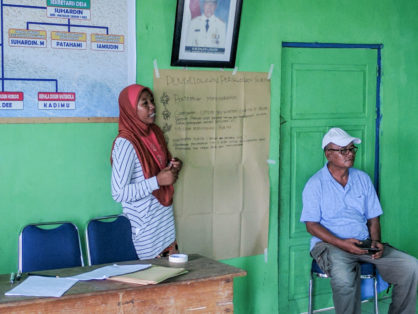
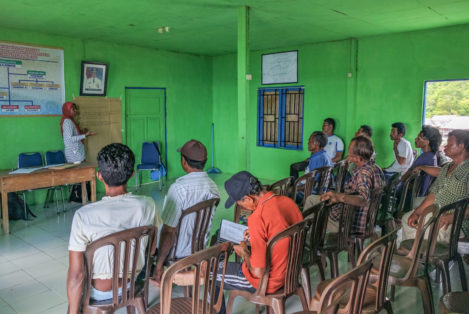
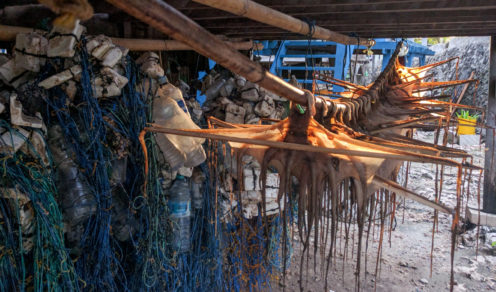
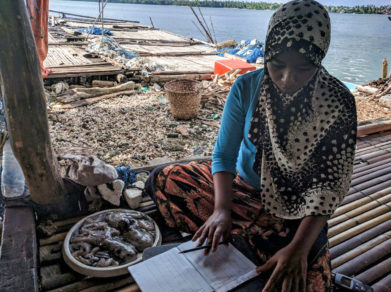
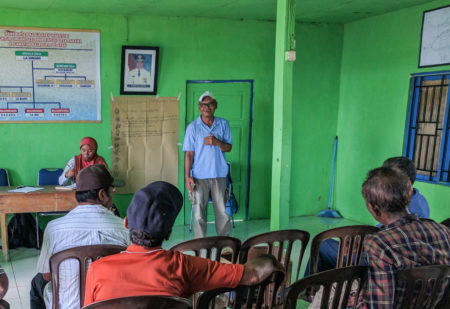
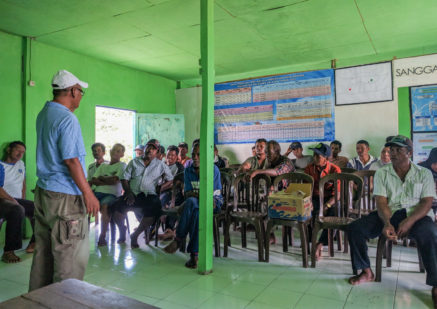
Amazing